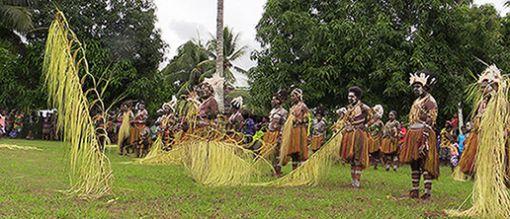Sydney and Wewak: 14 March 2021
Project Sepik and Jubilee Australia Research Centre released a new report today on the dangers posed by the proposed Frieda River Mine to the Sepik River and urged its rejection by Papua New Guinean government authorities.
The report is titled The Sukundimi Walks Before Me, in reference to the river spirit that Sepik people believe dwells in and protects the river. The Sepik River is one of the most important river systems in Papua New Guinea and the Asia-Pacific Region, and its catchment area is home to 400,000 people.
The report outlines six key reasons why the Frieda River mine should not go ahead, including:
- the irreplaceable environmental and cultural value of the region;
- glaring inadequacies of the environmental impact statement (EIS);
- the threat posed by a potential failure of the tailings dam;
- the inappropriateness of the alternative to a tailings dam, Deep Sea Tailings Disposal;
- the lack of consent of the Sepik communities;
- the similarities between the Frieda River Mine and other environmental disasters in PNG, particularly the Ok Tedi mine and the Panguna mine.
PanAust, the Chinese-owned, Australian-registered company, submitted its EIS for the project to PNG’s Conservation and Environmental Protection Authority (CEPA) in 2019. CEPA has to either reject or accept the EIS, which they have yet to do. If they were to accept the EIS, they would then grant the Environmental Permit needed for the project to go ahead. The company would use the permit to get the Mineral Development Authority (MRA) to approve a mining license. The report urges CEPA to reject the EIS outright and for the MRA to refrain from approving a mining license for the project
Emmanuel Peni, Coordinator of Project Sepik, said: ‘This Project poses unacceptable risks to our ancestors, ourselves and the lives of our unborn children. It risks the spirit of all plants and animals of the river, the lakes, the tributaries and streams. The company does not have the consent of the Sepik people. I sat with company executives in Brisbane in 2019 and told them, on behalf of the tens of thousands of people who live along the river, that they do not have free, prior and informed consent for this mine.’
Dr Luke Fletcher, Executive Director of Jubilee Australia Research Centre, said: ‘The Supreme Sukundimi Declaration last year showed that opposition to this mine is universal and widespread along the river: there is simply no way for this project ever to achieve free, prior and informed consent. Moreover, expert analysis detailed in our report has confirmed what the people already know: the mine will not be safe, cannot be safe. The enormous scale of the mine and tailings, in a mountainous area with high rainfall and high seismic activity, together mean that the mine poses unacceptable risks to the Sepik people and wildlife.’
Emmanuel Peni concluded: ‘This must be a world river. This must be a World Heritage Area. We need to bring this message out to the world: That, this is not only Papua New Guinea’s river and rainforests, but Papua New Guineans are custodians of something that must belong to the world.’
__________
Project Sepik
Project Sepik is a not-for-profit organisation based in Papua New Guinea that has been working in the Sepik region since 2016. Project Sepik advocates for the vision of a local environment with a sustained balance of life via the promotion of environmentally sustainable practices and holding to account those that are exploiting the environment.
Jubilee Australia Research Centre
Jubilee Australia Research Centre engages in research and advocacy to promote economic justice for communities in the Asia-Pacific region and accountability for Australian corporations and government agencies operating there.
Project Sepik and Jubilee Australia spearhead the Save the Sepik campaign. Find out more at www.savethesepik.org
